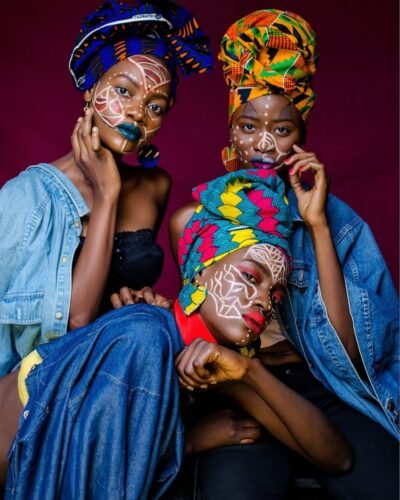"If the lion does not tell her story, the hunter will." — African ProverbAcross Africa, women are rising—not just in protest, but
“If the lion does not tell her story, the hunter will.” — African Proverb
Across Africa, women are rising—not just in protest, but in power. They are standing against violence, reclaiming their ancestral voices, and rebuilding systems of safety that colonialism, war, poverty, and patriarchy tried to erase. From bustling capitals to remote villages, a quiet revolution is turning into a thunderous roar: African women will not be silenced.
🌍 The Context: Violence Is Widespread, But So Is Resistance
Gender-based violence is a global crisis, but on the African continent, it is deeply shaped by layers of colonial history, economic exploitation, and cultural disruption. Systems that once protected women were fractured by outside forces—from British and French legal impositions to religious and military violence introduced by outsiders.
But even as these forces tried to erase African women’s autonomy, the spirit of resistance never died. It adapted. It endured. And now, it is leading change.
✊🏾 Across the Continent: Movements of Power and Protection
Here are just a few of the women-led movements shifting history, policy, and culture:
🇰🇪 Kenya – Usikimye (Don’t Be Silent)
Kenyan women have taken to the streets by the thousands, protesting a surge in femicide and sexual violence.
Njeri Migwi of Usikimye operates safe houses and emergency rescues.
Editar Ochieng founded a center in Kibera where survivors become advocates.
Grassroots movements like Cucu Jikinge are even teaching grandmothers self-defense.
They are not asking for safety—they are creating it.
🇿🇦 South Africa – #AmINext and the #TotalShutdown Movement
South African women face one of the highest GBV rates in the world, but they’ve responded with nationwide marches and policy pressure.
In 2018, the #TotalShutdown Movement demanded accountability from the state.
Organizations like the Soul City Institute center Black feminist care and education.
Their chant? “My body is not your crime scene.”
🇳🇬 Nigeria – #SexforGrades and Stand to End Rape (STER)
In a country where sexual violence was long silenced, Nigerian women have turned hashtags into real-world impact.
STER provides survivor services, policy reform, and global advocacy.
#ArewaMeToo broke silence in northern Nigeria, where survivors face intense stigma.
They are rewriting laws and breaking cultural taboos.
🇸🇩 Sudan – The Kandakas of the Revolution
Sudanese women helped bring down a dictatorship in 2019—leading marches and organizing communities.
Alaa Salah became an icon in a white thobe, chanting truth to power.
Today, these women still fight against sexual violence and FGM, even under military threats.
Their strength is not new—it is ancestral.
🇸🇱 Sierra Leone – Girls Not Brides & Purposeful
Child marriage and FGM were deeply rooted, but Sierra Leonean women have fought back.
In 2023, the country banned child marriage, a victory decades in the making.
Girls are now being trained to advocate for themselves, in schools and communities.
They are not victims—they are architects of a safer future.
🇺🇬 Uganda – Theatre for Healing, Policy for Change
Ugandan women use storytelling, song, and art to break silence around violence.
Raising Voices trains local leaders to shift mindsets and build safe communities.
Akina Mama wa Afrika shapes a bold, unapologetic Pan-African feminist agenda.
They are turning culture into a tool of liberation.
🧠 Beyond Protest: This Is Strategy, Not Just Survival
This is not just about pain. This is about power. These women are:
Changing laws
Educating girls and boys
Providing shelter and healing
Using media, art, and digital tools
Holding governments accountable
Reclaiming spiritual and cultural wisdom
Many of them do this work without institutional support. Some do it while under threat. Some have buried their sisters. Some are healing themselves while helping others heal.
Still, they rise.
🔥 Remember the Roots: This Isn’t New
Before colonizers arrived, many African societies had systems of justice, care, and protection—many rooted in matriarchal values, community accountability, and spiritual reverence for womanhood. Colonization brought legal erasure, violence, and patriarchal religion that sought to subdue women’s power.
Today, African feminists are not just moving forward. They are reaching back.
“When the roots are deep, there is no reason to fear the wind.” — African Proverb
🌺 A Call to Honor, Not Just Observe
Let us not flatten African women’s work into tragedy or tokenism. These are not only stories of suffering—they are stories of brilliant strategy, spiritual power, and generational love.
To stand in solidarity means to:
Learn from their work
Support their organizations
Share their stories without erasure
Fund their visions without strings
Honor their leadership without colonizing it
African women are not waiting for permission. They are building a world where their daughters will not have to scream to be believed.
Let’s stand with them—not in pity, but in partnership. Not with saviorism, but with respect.
